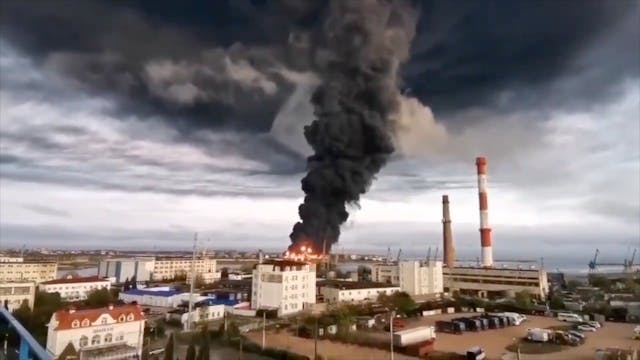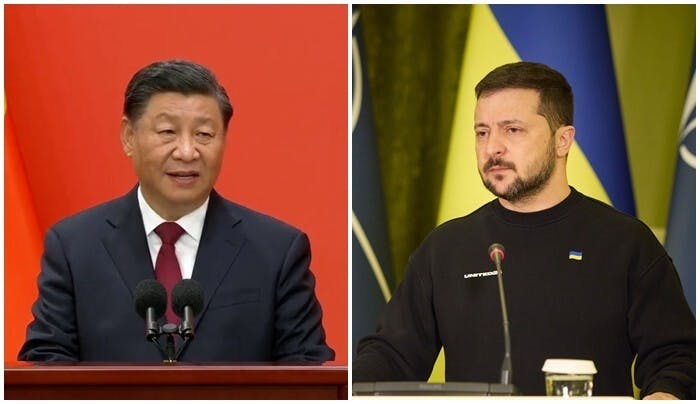國家主席習近平與烏克蘭總統澤倫斯基4月26日進行了史無前例的電話會談之後,俄羅斯和烏克蘭之間在中國的調解下,可能進行的談判之門現已敞開──這取決於俄烏戰爭的發展、中國作為調解人提出的解決方案,以及兩個交戰國家走向談判桌的意願有多大。
習近平:中國既不會隔岸觀火,也不會拱火澆油
4月26日下午,習近平向澤連斯基表示,中烏關係走過了31年的發展歷程,達到戰略夥伴關係水平。 習近平讚賞澤連斯基多次表示重視發展中烏關係和對華合作,對烏方在俄烏衝突初期協助中國公撤離烏克蘭表示感謝。習近平表示,相互尊重主權和領土完整是中烏關係的政治基礎。
習近平說,雙方要着眼未來,堅持從長遠角度看待和謀劃兩國關係,延續雙方相互尊重、真誠相待的傳統,推動中烏戰略伙伴關係向前發展。習近平表示,無論國際風雲如何變幻,中方願同烏方一道,把兩國互利合作向前推進。
習近平指出,烏克蘭危機複雜演變,對國際形勢產生重大影響。 他強調,中方始終站在和平一邊,核心立場就是勸和促談。為此,他相繼提出了「四個應該」(各國主權、領土完整都應該得到尊重、《聯合國憲章》宗旨和原則都應該得到遵守、各國合理安全關切都應該得到重視、一切有利於和平解決危機的努力都應該得到支持)、「四個共同」(共同支持一切致力於和平解決烏克蘭危機的努力、共同反對使用或威脅使用核武器、共同努力確保全球產業鏈供應鏈穩定、共同為危機地區的平民過冬紓困 )和「三點思考」(衝突戰爭沒有贏家、複雜問題沒有簡單解決辦法、大國對抗必須避免)。
習近平又說,中國不是烏克蘭危機的製造者,也不是當事方。作為聯合國安理會常任理事國和負責任大國,中國既不會隔岸觀火,也不會拱火澆油,更不干趁機牟利的事。習近平表示,中方所作所為光明正大。對話談判是唯一可行的出路。
習近平續說,核戰爭沒有贏家。有關各方都應該保持冷靜克制,真正從自身和全人類的前途命運著眼,共同管控好危機。現在各方理性的思考和聲音在增加,應該抓住契機,為危機的政治解決積累有利條件。
習近平表示,中方將堅持勸和促談,為盡快止戰停火、恢復和平作出努力。為此,中方將派出負責歐亞事務的特別代表赴烏克蘭等國訪問,就政治解決烏克蘭危機同各方進行深入溝通。目前,中方已向烏方提供人道主義援助。
澤倫斯基:歡迎中方發揮重要作用
對習近平表達的立場,澤倫斯基首先祝賀近平再次當選習連任中國國家主席和中國取得的成就。 他相信,在習近平的領導下,中國一定能夠應對各種挑戰,實現可持續發展。
澤連斯基表示,中方在國際事務中秉持《聯合國憲章》宗旨和原則,在國際舞台上發揮着巨大影響力。烏方恪守「一個中國」政策,希望同中方開展全面合作,共同致力於維護世界和平與穩定。澤連斯基還對中方提供的人道主義援助表示感謝,歡迎中方通過外交手段解決危機發揮重要作用。澤倫斯基還任命前戰略工業部長里亞比金為新任駐華大使。
另一方面,習近平任命歐亞事務特別代表赴烏克蘭,探討通過外交途徑解決烏克蘭危機。據傳媒報道,中國駐俄羅斯前大使李輝已被任命為中國解決烏克蘭危機特別代表團團長。李輝曾於2009年至2019年擔任中國駐俄羅斯大使,他處理俄羅斯事務的經驗,或可助中方提出一個俄方和烏方都能接受的方案。
習近平與澤倫斯基的電話會談剛巧是北京駐法國大使盧沙野發表有爭議的言論兩天後,他曾表示前蘇聯國家「在國際法中不具有作為主權國家的有效地位」。立陶宛、拉脫維亞和愛沙尼亞召見中國臨時代辦,要求澄清盧沙野的言論。其他來自烏克蘭、摩爾多瓦、法國和歐盟的官員對盧沙野的言論表示不滿。盧沙野還指出,克里米亞問題「取決於人們如何看待這個問題」,因為克里米亞「一開始是俄羅斯的」,後來「在蘇聯時期交給了烏克蘭」。
盧沙野對克里米亞的評論似乎暗示,也許從中國的非官方立場來看,克里米亞的主權問題也存在爭議,因此烏克蘭最近堅持俄羅斯從克里米亞撤軍也同樣引起爭議。

打開實現俄烏談判的大門
習近平和澤倫斯基之間史無前例的電話會談,打開了可能通過第三方(即中國)實現俄烏談判的大門。
在與習近平通電話後,澤連斯基在接受廣播採訪時表示,烏中兩國有維護國家主權和領土完整的共同目標,這一共同立場為日後探討和平解決烏克蘭危機提供了可能。他又說,雙方同意核武器及核擴散不應出現在世界上──這是另一種共識,表明至少要避免最壞的情況,即在俄烏衝突中使用核武器,幾個月前,當傳媒報道俄羅斯方面可能會考慮使用小型核武器時,這種恐懼就出現了。
澤倫斯基透露,烏克蘭方面透露了烏方的和平方案及其特點──這一重要啟示促使中國立即派遣李輝前往烏克蘭。
如果俄方已就避免核武器達成默契,那麼中方下一步將進一步深入分析停火方案內容,進而展開對話。
中國試圖調停俄烏戰爭有以下5種情況。
首先,中國可以為雙方提出一些具體的停火措施,例如一、交換戰俘;二、為烏克蘭難民和其他平民建立和平走廊,和/或三、保障糧食供應和運輸──中國12條和平方案中的三點。
實踐具體的停火措施
第二,如前所述,如果能夠創造停火條件,那麼烏克蘭和俄羅斯將以中國為調解人進行談判和對話。這個階段可能會很艱難,因為在談判的過程中,雙方都需要逐個條件交換,比如烏克蘭可以放棄對克里米亞的主權要求,以換取俄方至少退出頓巴斯地區「一些地方」──這對俄烏雙方來說都是一個困難的條件。「哪些地方」將取決於烏克蘭軍隊目前如何擊退俄羅斯方面的攻擊──這種情況取決於雙方軍隊的表現。
第三,可能會暫時停火,但第二種達致談判的構想可能會破壞,又再引發戰爭和衝突。 考慮到雙方在每一輪談判中作出讓步的巨大困難,這種情況往往是可能發生的。
第四,中國可能需要法國的協助來應對談判進程和俄羅斯方面可能提出的要求,例如可以預見的要求烏克蘭退出北約──另一個困難的要求──這樣烏克蘭就會成為事實上在北約軍事勢力範圍內,俄羅斯和其他歐洲國家之間的緩沖地帶。
第五,如果在中法斡旋下能夠如願達成和解,那麼中國12點和平方案中的三點就有可能實現──終止單邊制裁、保障物流供應鏈穩定 ,以及促進戰後重建。
目前,必須實現第一步──邁向停火──才能實現第二步構想。否則,持續的衝突將繼續存在,即第三種情況。第四種情況很可能發生在俄羅斯將向烏克蘭方面提出要求和讓步的關鍵階段。第五種情況將是最理想的情況,意味衝突的終止和重建的開始。
總而言之,習近平與澤連斯基的電話會談是一個突破,批評者和觀察家可能不會完全認可和讚同。俄烏對話和談判的大門敞開着,中國進行了必要的調解並提出了解決方案。如果能夠達成互相停火的條件,那麼就需要進行更深層次的談判,俄羅斯和烏克蘭都必須作出讓步。如果各有關方面都有達成和平解決的政治意願,那麼兩次世界大戰的起源地歐洲有望恢復和平。希望在中國的斡旋和各有關方面的政治意願下,未來幾年將避免另一場可能發生的第三次世界大戰。
Scenarios of China’s diplomatic mediation in the Russo-Ukrainian war
After the unprecedented telephone discussion between President Xi Jinping and President Volodymyr Zelenskyy on April 26, the door of a possible negotiation between Russia and Ukraine, with the mediation from the People’s Republic of China (PRC), is now open ajar – a situation depending on the development of the Russo-Ukrainian war, the proposed solutions from the PRC as a mediator, and the willingness of the two warring states to go onto the negotiating table.
On the afternoon of April 26, President Xi Jinping told President Zelenskyy that China and Ukraine had passed 31 years of development, and that both sides reached the standard of being strategic partners. Xi praised Zelenskyy for attaching importance to the cooperative relations between China and Ukraine. President Xi expressed his gratitude to the Ukrainian side for assistance in the evacuation of Chinese residents from Ukraine during the early phase of the Russo-Ukrainian conflicts. Xi said that mutual respect for sovereignty and territorial integrity laid down the political foundation of the Sino-Ukrainian relations.
Both sides, according to Xi, must look to the future by adopting a long-term perspective to design their bilateral relations while maintaining mutual respect and the tradition of sincerity in promoting strategic partnership. According to Xi, China’s willingness to develop its closer relations with Ukraine is consistent and clear, regardless of the changing international atmosphere. China is willing to promote Sino-Ukrainian relations together.
President Xi added that the Ukrainian crisis occurs amid complex international circumstances with tremendous impacts on the world. He emphasized that China is standing on the side of peace with the core position of advocating and promoting dialogue. As such, President Xi proposed “three considerations” (conflicts and war do not have a winning side; complex issues do not have simple solutions; and confrontations among large states have to be avoided), four mutual positions (mutually supporting efforts to reach a peaceful resolution over the Ukrainian crisis, mutual opposition to the usage of nuclear weapons, mutual diligent work to protect the stability of global logistical supply chains, and mutual efforts to deal with the winter encountered by residents in regions plagued with crises), and four normative stance (respect of the sovereignty and territorial integrity of all states, abiding by the aims and principles of the United Nations Charter, attaching importance to the national security and concerns of all states, and support of all efforts favourable to the peaceful resolution of crises).
President Xi added that China was not the state that created the Ukrainian crisis. But as a responsible state in the United Nations, China cannot just watch how the crisis is unfolding. Nor does China engage in anything beneficial to itself. China, according to Xi, does things in a transparent way and in good conscience, adopting the view that dialogue is the way out of the Ukrainian crisis.
Xi added that a nuclear war does not have any winning side, but the states involved in wars must calmly deal with their disputes with the foremost consideration of protecting themselves and the future of the world. As such, the warring states should grasp the opportunities to engage in reflections and dialogues to reach peaceful solutions for Europe.
The PRC, according to Xi, insists on peaceful dialogue and tries its best to promote peace. Therefore, China is going to send a special representative dealing with European and Asian affairs to Ukraine for a visit, and this representative will engage in deep communication and discussions. Currently, China is providing humanitarian aid to the Ukrainian side.
In response to President Xi’s stated position, President Zelenskyy firstly congratulated Xi for being re-elected as the PRC President and for the achievements made by China. He believed that, under Xi’s leadership, China would be able to cope with various challenges and develop in a sustainable way.
This photo taken on March 14, 2022 shows Ukrainian people move towards a border crossing at the border area between Ukraine and Poland. (Xinhua/Ren Ke)
Moreover, China is operating in conformity with the United Nations Charter and principles, and it will exert tremendous influence in the politics of the international world. Ukraine abides by the principle of one-China policy and hopes to cooperate with the PRC to maintain world peace and stability. Zelenskyy also expressed his gratitude to China’s humanitarian aid and welcomes China to perform its functions of resolving the Ukrainian crisis through diplomatic means. Zelenskyy also appointed the former strategic industries minister Pavel Ryabikin as the new ambassador to the PRC.
On the other hand, President Xi appoints a special representative on Eurasian affairs to Ukraine to explore a diplomatic solution to the Ukrainian crisis. The media reported that the former Chinese ambassador to Russia, Li Hui, was already appointed to head the PRC delegation to Ukraine. Li Hui served as the PRC ambassador to Russia from 2009 to 2019. His experience in dealing with the Russian affairs can perhaps help the Chinese side produce a solution acceptable to not only the Russian but also the Ukrainian side.
President Xi’s telephone discussion with President Zelenskyy came coincidentally two days after a controversial remark made by Beijing’s ambassador to France, Lu Shaye, who had said that the former Soviet states do not have “effective status in the international law.” Lithuania, Latvia, and Estonia summoned the PRC representatives to ask for clarification of Lu’s remarks. Other officials from Ukraine, Moldovia, France, and the European Union raised their eyebrows over Lu’s remarks. Lu also noted that the question of Crimea “depends on how the problem is perceived” because the region had been “at the beginning Russian” and was later “offered to Ukraine during the Soviet era.”
Lu’s comments on Crimea seemed to imply that, perhaps from the unofficial Chinese position, the sovereignty issue of Crimea was also contentious and as such Ukraine’s recent insistence in the Russian military withdrawal of Crimea was equally controversial.
The unprecedented meeting between Xi and Zelenskyy opens the door ajar to the possibility of a Russo-Ukrainian negotiation through the third party, namely the PRC.
After the telephone discussion with President Xi, Zelenskyy in a broadcast interview said that Ukraine and China have the common objective of protecting national sovereignty and territorial integrity – a common stance that points to the possibility of exploring a peaceful solution over the Ukrainian crisis later. He added that both sides agreed that nuclear weapons and their proliferation should not be seen in the world – another consensus that points to the avoidance of at least the worst-case scenario, namely the usage of nuclear weapons in the Russo-Ukrainian conflicts, which was a fear emerging several months ago when the media reported that the Russian side might toy with the idea of utilizing small nuclear weapons.
Zelenskyy revealed that the Ukrainian side revealed its peaceful solution and its features – an important revelation that necessitated the PRC to send Li Hui to Ukraine immediately.
If the consensus on the avoidance of any nuclear weapon is already a tacit one from the Russian side, then the next step is for China to proceed toward deeper analyses of the content of ceasefire and then dialogue.
There are five scenarios for the Chinese attempt at mediating in the Russo-Ukrainian war.
First, China can propose some concrete measures for both sides to proceed toward ceasefire, such as (1) the exchange of prisoners, (2) the creation of a peaceful corridor for refugees and other residents in Ukraine, and/or (3) the protection of logistical supply and transport – three points out of China’s 12-point peace solutions.
Second, if the conditions for ceasefire can be created, as mentioned above, then Ukraine and Russia will proceed toward negotiation and dialogue with the PRC as the mediator. This stage will likely be a very difficult one, because in the process of negotiation, both sides would have to exchange their conditions one by one, like Ukraine may abandon its claim over Crimea in exchange for the Russian side to withdraw at least from “some parts” from the Donbas region – a difficult condition to both sides. That “some parts” will depend on how the Ukrainian military is currently repelling the attack from the Russian side – a situation contingent upon the performance of the militaries from both sides.
Third, ceasefire may be reached temporarily but the second scenario of proceeding toward negotiation may break down, leading to war and conflicts again. This scenario will often be possible given the tremendous difficulties of both sides making concessions in each round of the negotiations.
Fourth, China will likely need the assistance from France to deal with the negotiation process and the possible demands from the Russian side, such as predictably a demand on Ukraine to withdraw from NATO – another difficult demand – so that Ukraine would become a de facto buffer state between Russia and other parts of Europe under the NATO’s sphere of military influence.
Fifth, if a settlement can be ideally reached with the mediation from China and France, then three points in the PRC’s 12-point peace solutions would have the possibility of being achieved – the termination of unilateral sanctions, protection of the stability of logistical supply chain, and the promotion of post-war reconstruction.
At this moment, the first scenario – moving toward ceasefire – will have to be achieved in order to proceed to the second one. Otherwise, the ongoing conflicts will persist, namely scenario three. Scenario four will likely occur at a critical stage when Russia will be expected to make demands on and concessions from the Ukrainian side. Scenario five will be the most ideal one, leading to the termination of conflicts and the process of reconstruction.
In conclusion, the telephone conversation between President Xi and President Zelenskyy was a breakthrough which might not be fully recognized and appreciated by critics and observers. The door for Russo-Ukrainian dialogue and negotiation is opened ajar, with the necessary mediation and proposed solutions from the PRC. If the conditions for mutual ceasefire can be reached, then a deeper process of negotiations entailing concessions to be made from both Russia and Ukraine will be necessary. If there is a political will from all stakeholders to reach a peaceful settlement, peace would hopefully be restored in Europe where the origins of the two World Wars could be seen. It is hoped that, with China’s mediation and with the political will from all stakeholders, another possible Third World War will be averted in the coming years.
原刊於澳門新聞通訊社(MNA)網站,本社獲作者授權轉載。原文網址:
https://www.macaubusiness.com/opinion-scenarios-of-chinas-diplomatic-mediation-in-the-russo-ukrainian-war/


































